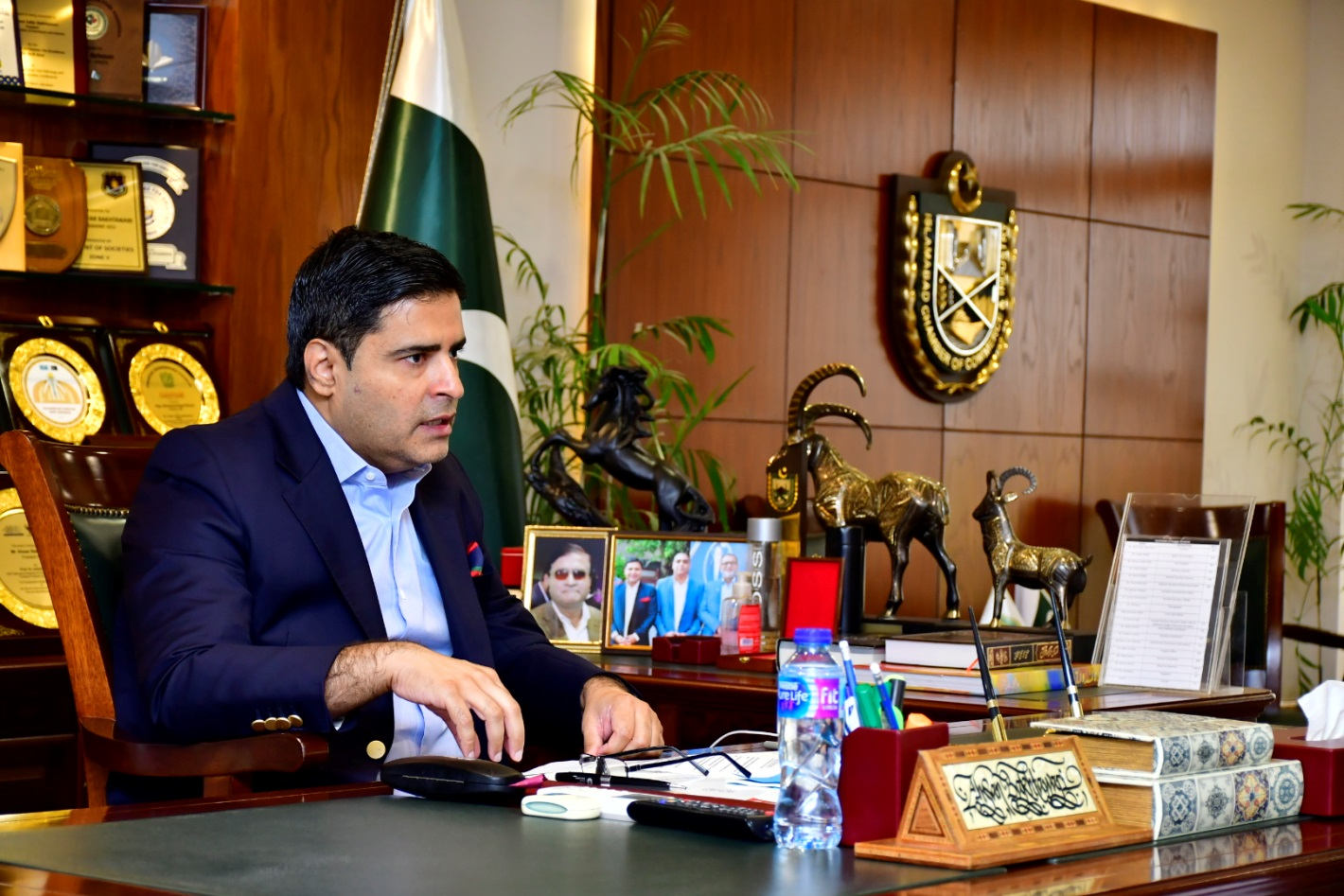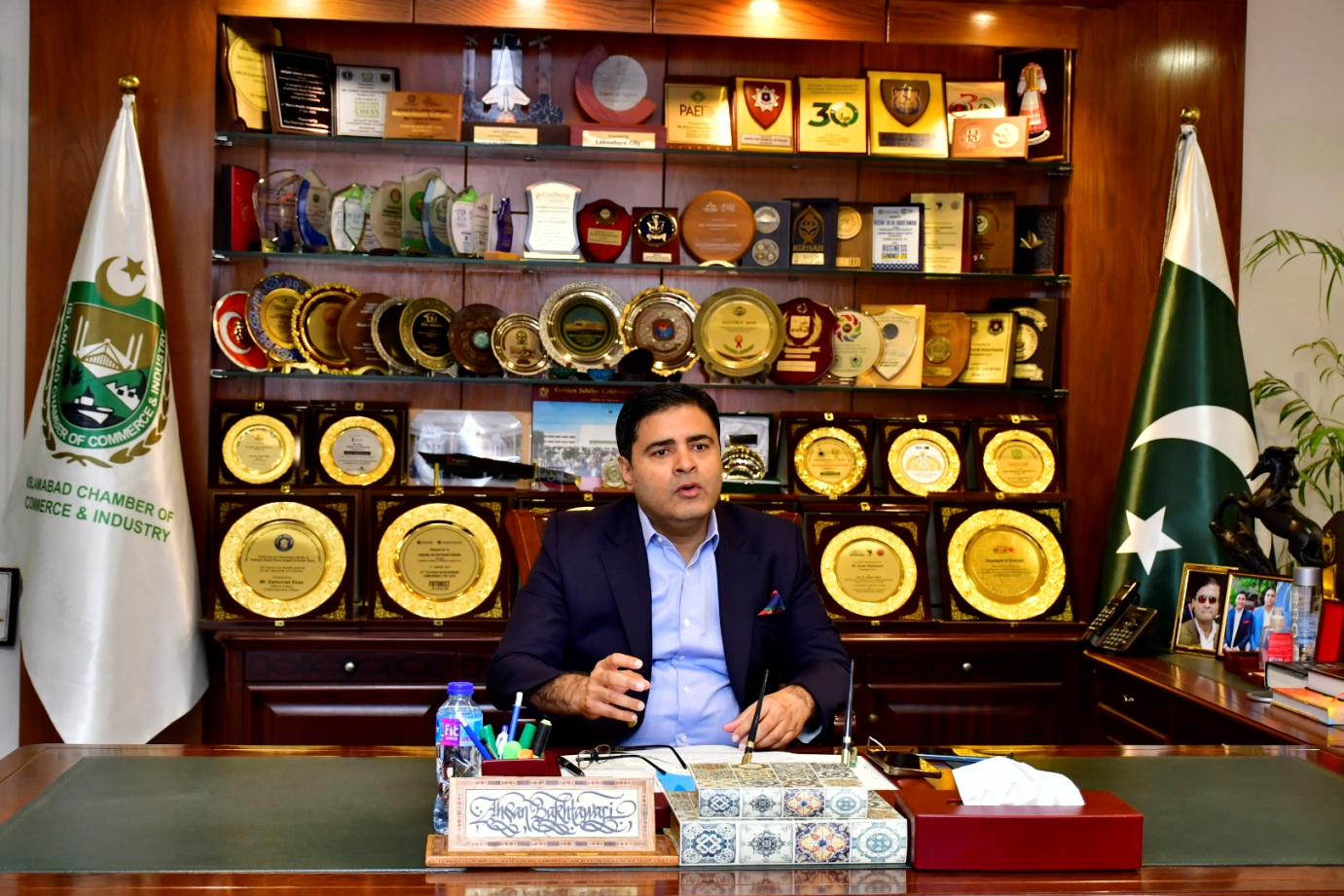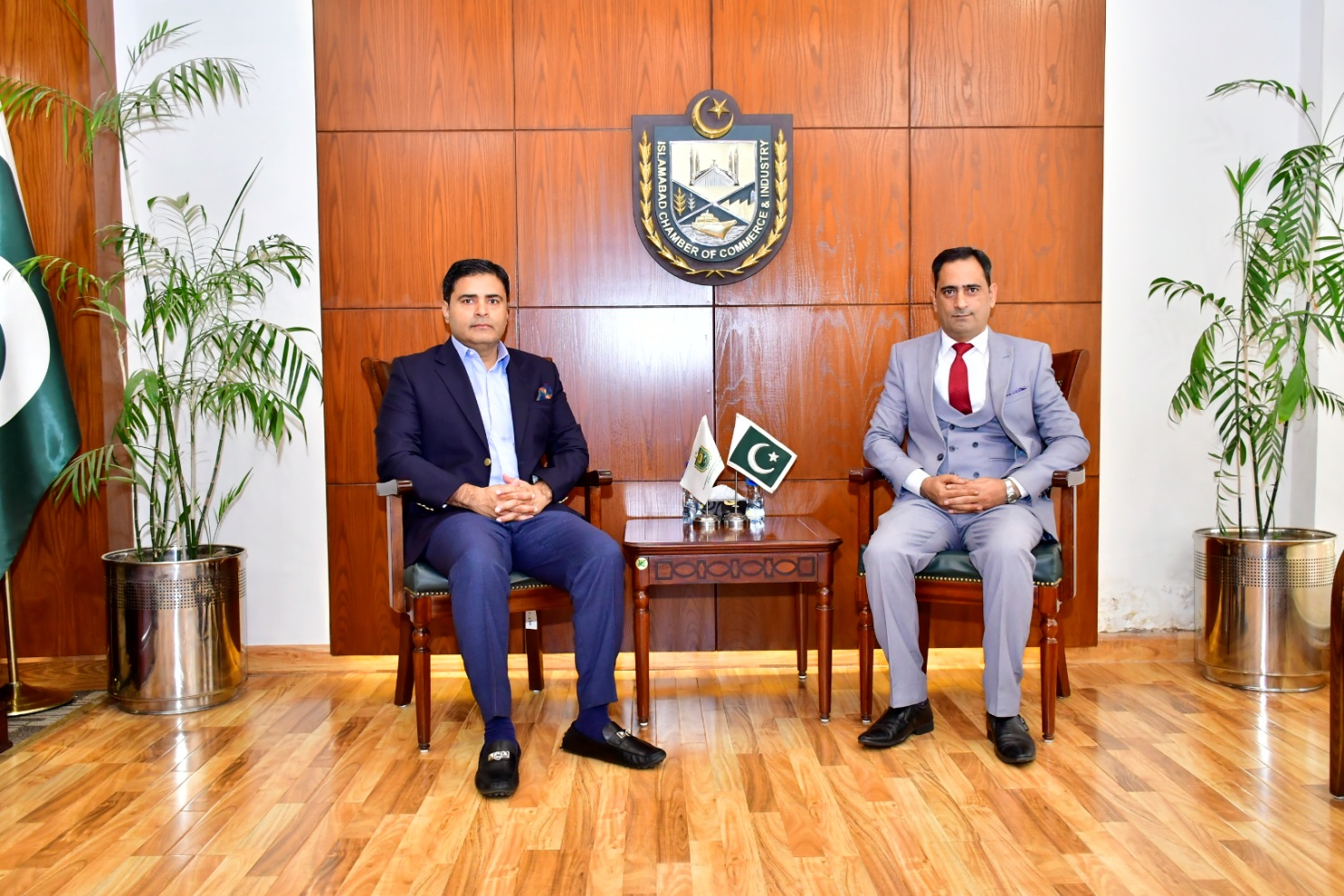Conversation with Ahsan Zafar Bakhtawari, President Islamabad Chamber of Commerce and Industry

In an exclusive conversation with Huashang News, Ahsan Zafar Bakhtawari discussed range of topics including 3rd Belt and Road Forum, China-Pakistan Economic Corridor, China Pakistan relations, ICCI.
Ahsan Zafar Bakhtawari is the President of Islamabad Chamber of Commerce and Industry (ICCI), one of the leading trade bodies in the country, which helps its members by raising their voice at relevant government forums to create an eco-system for ease of doing business. Ahsan Zafar Bakhtawari is also Managing Director of D.Watson Pharmacies and Super Stores, which is one of the famous brands having 27 outlets across Pakistan. He is a Member of Regional Integrity Committee (RIC), Directorate of General Intelligence & Immigration and Working Group on “Conductive Business Environment & Improvement Experts” for Chamber of Commerce and Industry, Ministry of Planning, Development & Special Initiatives. Ahsan Zafar Bakhtawari is also the Chairman of Pakistan Chemist Drug Association and held important managerial positions in the past. Mr. Bakhtawari is the recipient of many national and international awards as well. In an exclusive conversation with Huashang News, Ahsan Zafar Bakhtawari discussed range of topics including 3rd Belt and Road Forum, China-Pakistan Economic Corridor, China Pakistan relations, ICCI and others which are as following:
Q: What are your key takeaways from the 3rd Belt and Road Forum, and how do you see the forum contributing to the future development of CPEC and China-Pakistan economic relations?
Ahsan Zafar Bakhtawari, President ICCI: The 3rd Belt and Road Forum was a landmark event that demonstrated China's commitment to the Belt and Road Initiative (BRI) and its vision for global cooperation and development. The forum was attended by leaders from over 150 countries and international organizations including high level delegation from Pakistan headed by Prime Minister Anwar ul Haq Kakar, and resulted in a number of important announcements and agreements.
One of the key takeaways from the forum is that the BRI is evolving from a primarily infrastructure-focused initiative to a more comprehensive program that encompasses trade, investment, and cultural cooperation. This is reflected in the new BRI principles that were unveiled at the forum, which emphasize high-quality development, sustainability, and inclusiveness. Additionally, China will work with its BRI partner countries to strengthen the building of multilateral cooperation platforms covering energy, taxation, finance, green development, disaster reduction, anti-corruption, think tank, media, culture and other fields
Another key takeaway from the forum is that China is committed to working with its partners to build a "community of common destiny." This means that China is looking to build a more interconnected and interdependent world, where all countries can benefit from shared prosperity and development.
The 3rd Belt and Road Forum is expected to contribute to the future development of CPEC and China-Pakistan economic relations in a number of ways. First, the forum's focus on high-quality development and sustainability is in line with Pakistan's own development goals. Second, the forum's emphasis on trade and investment is likely to lead to increased Chinese investment in Pakistan and increased trade between the two countries. Third, the forum's commitment to building a "community of common destiny" is likely to strengthen the overall relationship between China and Pakistan.
The forum is likely to lead to increased Chinese investment in Pakistan. This investment will help to create jobs, boost economic growth, and improve the lives of ordinary Pakistanis. The forum is also likely to lead to increased trade between China and Pakistan. This will benefit both countries by expanding their markets and giving them access to a wider range of goods and services.
The forum is also likely to lead to enhanced cooperation between China and Pakistan in other areas, such as science and technology, education, and culture. This cooperation will help to strengthen the overall relationship between the two countries and promote mutual understanding and respect.
It is worth to mention about the recent G-20 Summit in India where India-Middle East-Europe Corridor was announced to counter BRI and CPEC but I think BRI and CPEC are the projects which cannot be counter or blocked by such announcements and in the future we should try to complete the development of Gwadar. The trade between China and Pakistan should be increased and needs to be speed up through Gwadar so that the confidence of people in CPEC is revived. The confidence and trust of people in CPEC in last government of PTI has been disturbed in my opinion and it is the need of the hour that government of Pakistan should take such measure and steps that PM Shehbaz Sharif government has taken in their 16 month tenure. Shehbaz Sharif government has tried to rebuild trust and confidence with Chinese government and now government needs to speed up the CPEC projects.

Q: How do you see CPEC contributing to Pakistan's economic development in the next 5-10 years?
Ahsan Zafar Bakhtawari, President ICCI: If we assess the CPEC contribution to Pakistan's economic development in the last 5-10 years, we will have an idea of CPEC impact on Pakistan's economic development in the next 5-10 years because in the history of 75 years of Pakistan no such development was done as compare to the development from CPEC in the last 10 years. So, CPEC project is expected to have a significant impact on Pakistan's economic development in the next 5-10 years. He Lifeng, the Chinese vice Premier and special presidential envoy recently visited Pakistan on the occasion of celebrations of 10 years of BRI and CPEC and we were also invited at the event where He Lifeng, the Chinese vice Premier an then Pakistan PM Shehbaz Sharif addressed the event. Both leaders vowed to further expand the cooperation between the two countries in fields related to investments in roads, railways especially ML1, ports, energy, and industrial development. CPEC is investing in a number of infrastructure projects that will improve Pakistan's transportation, logistics, and energy sectors. This will make it easier and cheaper to transport goods and people within Pakistan and to export goods abroad. It will also provide Pakistan with a more reliable and affordable source of energy.
CPEC is expected to lead to increased trade and investment between China and Pakistan. This will benefit both countries by expanding their markets and giving them access to a wider range of goods and services. Additionally, CPEC is expected to create millions of jobs in Pakistan, both directly and indirectly. This will help to reduce unemployment and poverty. This will lead to higher incomes and improved living standards for all Pakistanis.
In addition to these economic benefits, CPEC is also expected to have a number of social and cultural benefits. For example, CPEC is investing in education and healthcare projects that will improve the lives of ordinary Pakistanis. The project is also promoting cultural ties between China and Pakistan. The Karakoram Highway, which was built as part of CPEC, has made it easier and cheaper to transport goods between Pakistan and China. This has led to increased trade between the two countries. The Gwadar Port, which is also part of CPEC, is expected to become a major regional hub for trade and logistics. This will benefit Pakistan by increasing its exports and attracting foreign investment.
CPEC has also led to increased investment in Pakistan's energy sector. This has helped to improve Pakistan's power supply and Pakistan has the capacity to produce about 40000MW of energy whereas the requirement of Pakistan is 21000MW. So, it means in the coming years if any Chinese or foreign company want to come and invest or to set up factories in Pakistan then we have more than enough electricity at cheap tariffs for their requirement and it will also solve capacity issues as well. Additionally, I think if Chinese government take interest in Pakistan Railways and Pakistan International Airlines, then it may become a game changer projects for Pakistan. I may remind you that some years back we have formed Economic Corporation Organization (ECO) in which Iran and Turkey was included and the idea was to connect land routes (through Railway) between these countries. Now, if we revive this rail route between Pakistan, Iran and Turkey and connect it with CPEC, the potential and gains will be unimaginable. CPEC is still under construction, but it is already having a positive impact on Pakistan's economy. In the next 5-10 years, CPEC is expected to have an even greater impact on Pakistan's economic development.
Q: What role does ICCI play in promoting trade and economic linkages between Islamabad and the Special Economic Zones (SEZs) established under CPEC?
Ahsan Zafar Bakhtawari, President ICCI: ICCI plays a number of important roles in promoting trade and economic linkages between Islamabad and the SEZs established under CPEC. ICCI advocates on behalf of the business community to the government and other stakeholders to ensure that the SEZs are developed and operated in a way that is conducive to business. ICCI provides a range of services to businesses interested in investing in the SEZs, such as information on the SEZs, assistance with the investment process, and networking opportunities. ICCI promotes the SEZs to potential investors both domestically and internationally. ICCI provides a forum for businesses to resolve disputes that may arise in the course of their operations in the SEZs.
Additionally, ICCI has established a dedicated CPEC cell to provide information and assistance to businesses interested in investing in the SEZs. ICCI has organized a number of seminars and workshops on CPEC and the SEZs. ICCI has led delegations of businesses to visit the SEZs and meet with potential partners. ICCI has published a number of reports and articles on CPEC and the SEZs. ICCI's work in promoting trade and economic linkages between Islamabad and the SEZs is essential to the success of CPEC. By creating a favorable environment for business and attracting investment to the SEZs, ICCI is helping to create jobs and boost economic growth in Pakistan.
One important thing which is vital for the success of CPEC is that after the infrastructure and energy phase the SEZs phase need to be completed as soon as possible because the full dividends of this mega project will achieved once the SEZs are operational.
Q: How does ICCI foster cooperation and partnerships between local businesses in Islamabad and Chinese companies operating in Pakistan?
Ahsan Zafar Bakhtawari, President ICCI: The ICCI fosters cooperation and partnerships between local businesses in Islamabad and Chinese companies operating in Pakistan in a number of ways. ICCI regularly organizes B2B meetings and events to bring together local businesses and Chinese companies. This gives businesses the opportunity to learn about each other's products and services, and to explore potential partnerships. ICCI provides a range of information and assistance to local businesses interested in working with Chinese companies. This includes information on Chinese business culture, the Chinese market, and the investment opportunities available in China. ICCI also provides assistance with networking and matchmaking.
ICCI advocates on behalf of local businesses to the Chinese government and other stakeholders to ensure that they have a fair and equal opportunity to compete for business opportunities. In 2022, ICCI organized a delegation of local businesses to visit China to attend the China International Fair for Investment and Trade. This gave businesses the opportunity to meet with potential partners and explore investment opportunities in China. In 2023, ICCI signed a memorandum of understanding with the Chinese Chamber of Commerce in Pakistan to promote cooperation and partnerships between businesses in the two countries.
ICCI's work in fostering cooperation and partnerships between local businesses in Islamabad and Chinese companies operating in Pakistan is essential to the success of CPEC. By creating a favorable environment for business and promoting cooperation between local and Chinese businesses, ICCI is helping to create jobs and boost economic growth in Pakistan.
Q: How has the business landscape in Islamabad evolved during your tenure as President, and what role has ICCI played in that evolution?
Ahsan Zafar Bakhtawari, President ICCI: The business landscape in Islamabad has evolved significantly in recent years, due in part to the efforts of the ICCI. One of the most significant changes in the business landscape in Islamabad has been the growth of the IT sector. The IT sector has become a major contributor to the city's economy, and has created many new jobs. ICCI has played a key role in promoting the IT sector in Islamabad, by providing support to IT businesses and advocating for the creation of a favorable environment for the sector.
ICCI has also played a key role in improving the infrastructure and services available to businesses in Islamabad. ICCI has advocated for the development of new roads and bridges, as well as the improvement of the city's power and water supply. ICCI has also worked to improve the business regulatory environment in Islamabad. As a result of these efforts, the business landscape in Islamabad has evolved significantly in recent years. The city is now a more attractive destination for both domestic and foreign businesses. ICCI has played a key role in this evolution, by providing support to businesses, advocating for their interests, and working to improve the business environment in the city.
Apart from establishing a dedicated IT cell to provide support to IT businesses in Islamabad, ICCI has organized a number of seminars and workshops on IT and other emerging sectors. ICCI has led delegations of businesses to visit foreign countries to explore investment opportunities. ICCI has published a number of reports and articles on the investment potential of Islamabad. ICCI has worked with the government to develop a number of business-friendly policies and regulations.
ICCI's work in promoting the business landscape in Islamabad has had a positive impact on the city's economy. The city has seen a significant increase in economic growth and job creation in recent years. ICCI's work has also helped to make Islamabad a more attractive destination for both domestic and foreign investment.

Editor: Tahir Murtaza

